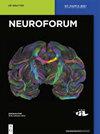Non-coding repeat expansions associated with familial adult myoclonic epilepsy: a new paradigm of gene-independent monogenic disorders
Q3 Medicine
引用次数: 0
Abstract
Abstract Familial adult myoclonic epilepsy (FAME) is a rare autosomal dominant disorder characterized by cortical myoclonic tremor and seizures. FAME has been mapped to chromosomes (chr) 2, 3, 5 and 8, but the cause has remained elusive for more than a decade. An expansion of intronic TTTTA and TTTCA repeats in SAMD12 was identified as the cause of FAME1 in Japanese families linked to chr 8 in 2018. This discovery triggered the identification of identical repeat expansions at five additional loci (FAME2: STARD7; FAME3: MARCHF6; FAME4: YEATS2; FAME6: TNRC6A and FAME7: RAPGEF2). These genes encode proteins with different functions and subcellular localizations and their expression is unaltered in available peripheral tissues, suggesting that the expansion is pathogenic independently of the gene itself. The pathophysiological mechanisms are not yet known but possibly include toxicity at the RNA level or translation of toxic polypeptides from the repeats, a mechanism known as repeat-associated non-AUG (RAN) translation. FAME is a paradigm of human genetic disorder caused by a non-coding expansion unrelated to the gene where it occurs.与家族性成人肌阵挛性癫痫相关的非编码重复序列扩增:基因独立单基因疾病的新范式
家族性成人肌阵挛性癫痫(FAME)是一种罕见的常染色体显性遗传病,以皮质肌阵挛性震颤和癫痫发作为特征。FAME已经被定位到染色体(chr) 2、3、5和8上,但病因十多年来一直难以捉摸。2018年,SAMD12中内含子TTTTA和TTTCA重复序列的扩增被确定为与chr 8相关的日本家庭中FAME1的原因。这一发现引发了在另外五个位点(FAME2: STARD7;FAME3: MARCHF6;FAME4: YEATS2;FAME6: TNRC6A和FAME7: RAPGEF2)。这些基因编码具有不同功能和亚细胞定位的蛋白质,它们在可用的外周组织中的表达不变,这表明扩增是独立于基因本身的致病性。病理生理机制尚不清楚,但可能包括RNA水平的毒性或重复序列中毒性多肽的翻译,这种机制被称为重复序列相关的非aug (RAN)翻译。FAME是一种人类遗传疾病的范例,由与发生的基因无关的非编码扩展引起。
本文章由计算机程序翻译,如有差异,请以英文原文为准。
求助全文
约1分钟内获得全文
求助全文
来源期刊

Neuroforum
NEUROSCIENCES-
CiteScore
1.70
自引率
0.00%
发文量
30
期刊介绍:
Neuroforum publishes invited review articles from all areas in neuroscience. Readership includes besides basic and medical neuroscientists also journalists, practicing physicians, school teachers and students. Neuroforum reports on all topics in neuroscience – from molecules to the neuronal networks, from synapses to bioethics.
 求助内容:
求助内容: 应助结果提醒方式:
应助结果提醒方式:


